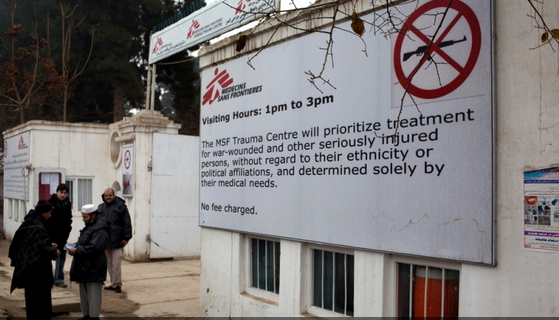Recently, Doctors Without Borders, also known as Médecins Sans Frontières or MSF, an organization committed to providing emergency care for refugees and those living in endangered areas, underwent an attack on their hospital located in the northern Afghan city of Kunduz.
The attack began at 2:08 AM on October 3rd, and continued until 3:15 AM. Twenty two people were killed during the aerial bombing raids and thirty seven were injured. In a statement by Dr. Joanne Liu, president of Doctors Without Borders, the views of the organization on this topic were revealed: “We have received apologies and condolences, but this is not enough. We are still in the dark about why a well-known hospital full of patients and medical staff was repeatedly bombarded for more than an hour.”
Events leading up to the destructive hour had been building up for months prior. Major fighting had rampaged the city for weeks before the event, with hundreds of new patients entering the Kunduz location daily. In the short time they were there, MSF treated four hundred patients in total, with around a hundred patients in the hospital at the time of the attack. In 2014 alone, the same hospital showed its importance by treating thousands of patients, performing 5900 surgeries and providing care for 22,000 people.
The most important issue under discussion, however, was the American role of the attack. According to government data, Doctors Without Borders had provided GPS coordinates to the Coalition and Afghan military and civilian officials repeatedly, with the most recent report given in the last week of September. Even more disturbing to note was the period of the attack itself; the attack wore on for over thirty minutes after the organization first informed the United States military officials within the area of the attack, and was not put to an end until much after word was received in Washington.
While the team desperately tried to shift the wounded patients to an undamaged room, its makeshift operating theater could not save all the lives of those wounded. With medical practitioners working diligently in Afghanistan since 1980, the shame brought to their honorable service was a true stain on American provincial care as well as all the other countries part of the global fabric.
As of now, Doctors Without Borders is demanding a full scale investigation be carried out by the International Humanitarian Fact Finding Commission, a byproduct of the Geneva Conventions. Doctors Without Borders (MSF) has also been a strong supporter of the Ministry of Public Health in eastern Kabul.
Concerns for the safety of future projects were heightened by the occurrence of another bombing of another bombing of a health center run by Doctors Without Borders on Oct. 23. The hospital in Yemen was destroyed by a military coalition led by Saudi Arabia. The destruction leaves at least 200,000 people with no access to life-saving medical care. Unfortunately, this type of bombing has not been uncommon during the seven month war the coalition is fighting against Houthi rebels. In this time of little support from surrounding countries, MSF faces several obstacles in its future.]
Poyani Bavishi
editor-in-chief

